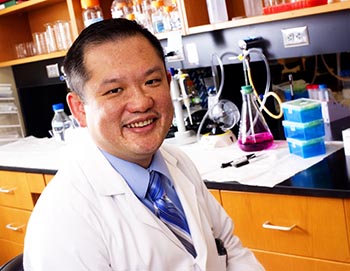UAB researchers have discovered that a new combination of two existing cancer drugs can kill triple-negative breast cancer cells. Triple-negative breast cancer is a highly aggressive subtype of breast cancer that does not express receptors for estrogen, progesterone or human epidermal growth factor. Because most cancer drugs target these receptors, triple-negative breast cancer is difficult to treat.
 The novel drug combination tested by UAB researchers pairs lapatinib — a chemotherapy drug from a class known as kinase inhibitors — with veliparib, a type of drug known as a PARP inhibitor. Both lapatinib and veliparib have individually been shown to be safe and well tolerated in breast cancer patients.
The novel drug combination tested by UAB researchers pairs lapatinib — a chemotherapy drug from a class known as kinase inhibitors — with veliparib, a type of drug known as a PARP inhibitor. Both lapatinib and veliparib have individually been shown to be safe and well tolerated in breast cancer patients.
Lapatinib is approved for use in human epithelial growth factor receptor 2 (HER2)-positive breast cancers, but this is the first time it has been studied in combination with veliparib, both in triple-negative breast cancer cells as well as in mouse models of triple-negative breast cancer.
The UAB findings, published on Oct. 11, 2012 in the journal PLOS ONE, show that the lapatinib-veliparib combination produces persistent damage in the DNA of triple-negative breast cancer cells, leading to cell death, says Shih-Hsin (Eddy) Yang, M.D., Ph.D., the ROAR Southeast Cancer Foundation Endowed Professor in the UAB Department of Radiation Oncology and associate scientist in the experimental therapeutics program at the UAB Comprehensive Cancer Center.
Poly ADP ribose polymerases, or PARPs, are enzymes that repair some types of damage done to DNA. As a result, PARP-inhibiting drugs are currently being tested in cancer therapy to render cancer cells more sensitive to treatments that damage DNA, such as chemotherapy and radiation.
Human epidermal growth factor receptor (EGFR) pathways are responsible for translating signals from outside the cell into signals within the cell, including activation of DNA repair. Various therapeutic drugs are used within this pathway to kill cancer cells. “However, triple-negative breast cancers can be particularly aggressive because they learn how to survive despite these and other therapies,” says Yang. “This makes treating triple-negative breast cancer patients successfully quite difficult and they end up having recurrences with limited treatment options that work.”
An expert in DNA repair in cancer cells, Yang has been studying EGFR and PARP inhibitors in relation to multiple cancer types for several years. “If you hit triple-negative cancer cells with lapatinib, among other things, it breaks down the ability of the cell to repair its DNA,” Yang explains. “By utilizing the PARP inhibitor on top of that, the cancer cell continues to accumulate damage to its DNA, causing the cell to die. This potent combination causes an interaction that is lethal to triple-negative breast cancer cells.”
Yang and his research team plan to present clinical trial concepts based on this study to the Translational Breast Cancer Research Consortium in November 2012.
“The intriguing results of our study not only points to the broader utility of PARP inhibitors, but to a potential new combined therapy for triple-negative breast cancer patients,” Yang says. “We are hoping that this treatment plan can eventually improve cure rates while reducing treatment-related side effects.”